The school where kids are raised to be personalities ( ...Leaflet in PDF)
Where to find us
In a family villa with a garden in Prague 4 – Hrnčíře, in the beautiful environment of a protected natural area of meadows and ponds, and near a multifunctional sports field. Parking is possible right by the school and a city bus stop is a 400 meters walk through a quiet residential neighborhood.
Our beginnings
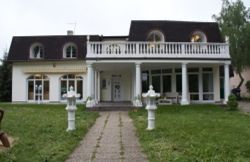 The establishment of an elementary school resulted of interest of the parents of children that came to our pre-school a few years back and have grown into schoolchildren. We have been
operating a Czech/English Montessori pre-school for children
from 1.5 to 6 years-old since January 2010. Together with the
parents and the children we have built a wonderful family
environment that they enjoy coming to, where the teachers
and children of various ages and nationalities gather and learn
to know and stand up for themselves as well as to respect
others, to be independent, but also to cooperate, to take care
of themselves, but also others and their environs. And they
learn new things in their natural way – by exploring, creating,
experimenting. More than 70 children have passed through
Willowtrees and this year, 36 are attending our pre-school. We
have known most of our current preschoolers since they were
in diapers and we wish to continue being their guides. And we
are also looking forward to new children and parents who are
searching for a school that is a bit different from what they remember from their own childhood.
The establishment of an elementary school resulted of interest of the parents of children that came to our pre-school a few years back and have grown into schoolchildren. We have been
operating a Czech/English Montessori pre-school for children
from 1.5 to 6 years-old since January 2010. Together with the
parents and the children we have built a wonderful family
environment that they enjoy coming to, where the teachers
and children of various ages and nationalities gather and learn
to know and stand up for themselves as well as to respect
others, to be independent, but also to cooperate, to take care
of themselves, but also others and their environs. And they
learn new things in their natural way – by exploring, creating,
experimenting. More than 70 children have passed through
Willowtrees and this year, 36 are attending our pre-school. We
have known most of our current preschoolers since they were
in diapers and we wish to continue being their guides. And we
are also looking forward to new children and parents who are
searching for a school that is a bit different from what they remember from their own childhood.
Our Motto: The school where kids are raised to be personalities.
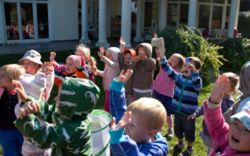 We chose it for our pre-school and find it just as important in school. Living in a society is a natural
human need and children want to fit in even more, to be accepted and respected by others. When they
encounter strict commands too often, when others decide everything for them, when they always have
to just sit and listen, they lose their certainty and self-confidence, the courage to express themselves. We believe that every child has potential that can be developed much better when adults treat them
with love, confidence, openness and respect. We believe that we can achieve more with understanding
and sensitive guidance than with commands, restrictions, rewards and punishments. We believe in
freedom within clearly-defined boundaries. We create an environment in which children can naturally
and freely grow into self-confident and independent as well as tolerant and respectful personalities.
We chose it for our pre-school and find it just as important in school. Living in a society is a natural
human need and children want to fit in even more, to be accepted and respected by others. When they
encounter strict commands too often, when others decide everything for them, when they always have
to just sit and listen, they lose their certainty and self-confidence, the courage to express themselves. We believe that every child has potential that can be developed much better when adults treat them
with love, confidence, openness and respect. We believe that we can achieve more with understanding
and sensitive guidance than with commands, restrictions, rewards and punishments. We believe in
freedom within clearly-defined boundaries. We create an environment in which children can naturally
and freely grow into self-confident and independent as well as tolerant and respectful personalities.
Our Mission
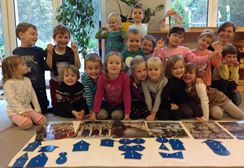 With a bit of exaggeration… We all went to a classic school at a time when no other opportunities were
available. We acquired a lot of encyclopedic information, most of which we quickly forgot and either
didn’t need it in our later lives or else had to learn it again to truly understand and use it. We often
also learned to not contemplate, to avoid discussions, to passively receive information, to be afraid of
teachers, tests and exams, to hate some subjects and underestimate ourselves, to memorize without
understanding. We want our children’s school to be different – for it to be a place where they enjoy
going, and not just to see their friends, where they fear nothing and feel successful, where they study with joy, without always sitting at their desks and watching the blackboard, but rather learning in
a manner that is most natural to us all, and even more so to children – through own activities to acquire experiences that we can draw general conclusions from. We want our school to be a preparation for real life in today’s world, where we do not only need knowledge, but also inner strength and self-
confidence, the ability to cooperate, to be assertive as well as to make concessions, to think in
contexts, to resolve new situations, to create, to improvise.
With a bit of exaggeration… We all went to a classic school at a time when no other opportunities were
available. We acquired a lot of encyclopedic information, most of which we quickly forgot and either
didn’t need it in our later lives or else had to learn it again to truly understand and use it. We often
also learned to not contemplate, to avoid discussions, to passively receive information, to be afraid of
teachers, tests and exams, to hate some subjects and underestimate ourselves, to memorize without
understanding. We want our children’s school to be different – for it to be a place where they enjoy
going, and not just to see their friends, where they fear nothing and feel successful, where they study with joy, without always sitting at their desks and watching the blackboard, but rather learning in
a manner that is most natural to us all, and even more so to children – through own activities to acquire experiences that we can draw general conclusions from. We want our school to be a preparation for real life in today’s world, where we do not only need knowledge, but also inner strength and self-
confidence, the ability to cooperate, to be assertive as well as to make concessions, to think in
contexts, to resolve new situations, to create, to improvise.
Our educational program
Creative Montessori school. Through a modern, open and creative interpretation of the principles of the Montessori pedagogy we are striving for the holistic development of children. We support:
-
self-reliance, independent decision-making, self-confidence and responsibility,
-
creativity, the ability to think in context, to resolve problems, critical thinking, divergent thinking,
-
co-operation, tolerance, a feeling of co-responsibility for our environment,
-
joy of learning based on freedom and inner motivation.
Our curriculum respects the goals and contents given for all elementary schools in the Czech Republic so that the students can successfully continue with their education in other schools. The methods are different:
-
The teacher does not present the subjects to the entire class, but works with smaller groups or with individual students, the school day does not have a fixed schedule of classes, but the curriculum from various subjects is integrated into theme projects, taken in contexts and from different angles,
-
The teacher has a close relationship with each student and gets to know his/her strengths and weaknesses through observation and open mutual communication, thus guiding him/her sensitively and with respect to his/her needs, interests, abilities and tempo, and inspiring the student to do activities suitable for mastering a certain subject, helping him/her to select the immediate tasks and to set goals; under the teachers’ sensitive guidance the students gradually learn to plan, verify and defend their work and also to present it to the others,
-
The teachers follow the general educational goals, but also the personal goals of the students so that the lessons are individualized to a certain extent, enabling every child’s optimal development; the students have room to improve at their own tempo, without stress, in areas they have less aptitude while, on the contrary, proceeding much faster in areas they are talented or interested in.
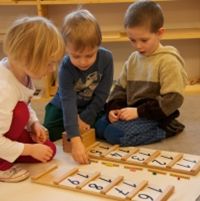 Bilingual education in Czech and English. There is always one Czech and one English-speaking teacher in
the classroom, each of them working with the students individually or in small groups. Thus the children
go through the entire curriculum in both languages and encounter a foreign language on a daily basis
in common situations, where they can communicate with the teachers, turn to them with questions
and requests or to share experiences, talk to them during lunch, on trips, after school. Thus a foreign
language becomes a natural part of life for them. They perceive its sound, lose their fear of it, learn
words, then sentences and use them in real situations.
Bilingual education in Czech and English. There is always one Czech and one English-speaking teacher in
the classroom, each of them working with the students individually or in small groups. Thus the children
go through the entire curriculum in both languages and encounter a foreign language on a daily basis
in common situations, where they can communicate with the teachers, turn to them with questions
and requests or to share experiences, talk to them during lunch, on trips, after school. Thus a foreign
language becomes a natural part of life for them. They perceive its sound, lose their fear of it, learn
words, then sentences and use them in real situations.
Mixed-age classrooms. School is the only place where we sort people according to age, never earlier or later on. In the family or at work we need to know how to live with people of various ages, to cooperate, come to agreements, divide tasks and responsibilities, to understand the role of the older and more experienced or the younger. There is no need to divide children by age at school either. Children of the same age are not the same; they do not necessarily have the same abilities, needs or interests. In our school children from two or three grades are all together in one classroom (grades 1-3 or 4-5). The younger children learn from the older ones, looking up to them. When they work next to each other the younger children see where they are going, what their next tasks will be, and that is an impulse for them. The older children gladly accept being the more experienced role models, sometimes helping the younger children to understand a new task, whereby they repeat the knowledge they have attained and improve their communication, rhetoric and presentation skills.
Montessori materials and approach. We creatively use various materials, stories, experiments or scientific projects that enable the children to get knowledge through their own activity and exploration, simplifying their gradual transition from the concrete to the abstract (e.g. we can learn multiplication with beads, by creating geometrical shapes with strings, by clapping; instead of an empty equation on the blackboard the Pythagoras theorem can be a puzzle from which the children deduce the equation themselves).
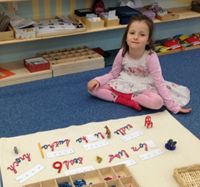 Verbal evaluation. We consider grades to be a limited and misleading evaluation that does not give
a good picture of what a child really knows and how he/she has developed in a given area. Thus we
provide verbal evaluations in our school. Each child gets regular feedback from discussions with the
teacher about what he/she has worked on and learnt within, how he/she evaluates the work, where he/
she improved, what needs more work. The parents get an overview of their children’s work from their
portfolios and journals and from consultations with the teachers. They can also visit the classroom and
watch the children working. Mid-term and annual reports are also verbal and do not only evaluate the
level of knowledge achieved, but also the child’s efforts and progress. The reports can be converted into
grades if required, for example in case of change of school or admission to an upper-elementary school.
Verbal evaluation. We consider grades to be a limited and misleading evaluation that does not give
a good picture of what a child really knows and how he/she has developed in a given area. Thus we
provide verbal evaluations in our school. Each child gets regular feedback from discussions with the
teacher about what he/she has worked on and learnt within, how he/she evaluates the work, where he/
she improved, what needs more work. The parents get an overview of their children’s work from their
portfolios and journals and from consultations with the teachers. They can also visit the classroom and
watch the children working. Mid-term and annual reports are also verbal and do not only evaluate the
level of knowledge achieved, but also the child’s efforts and progress. The reports can be converted into
grades if required, for example in case of change of school or admission to an upper-elementary school.
Daylong program. The afternoon program featuring after-school activities and clubs ends at 5 p.m.
Our vision
In September 2014 we are opening one classroom for the first three grades and we will gradually build a lower elementary school (grades 1-5) with two mixed-age classrooms for a total of 50 children. Upon completing the 5th grades of other Czech or international elementary schools. In case of interest of the parents, we will expand our curriculum to the upper elementary level. grade our students will be prepared to continue in their education in the upper
School fees
The school fees of 10,000 CZK per month include the tuition and the after-school activities. Organic lunches provided by Bionea are paid separately at 100 CZK per day.
Registration for the school year 2016/2017
We are accepting children for grades 1-5. Registration takes place on 2.–10.2.2016. Parents and children are invited to our school during school hours to observe the regular classroom work and to discuss their needs and expectations. You can arrange your visit by email at info @uvrbicek.cz or by telephone at 604 293 047. The child’s birth certificate and the parent´s identification must be submitted.
Registration can also be agreed individually outside of the announced dates.